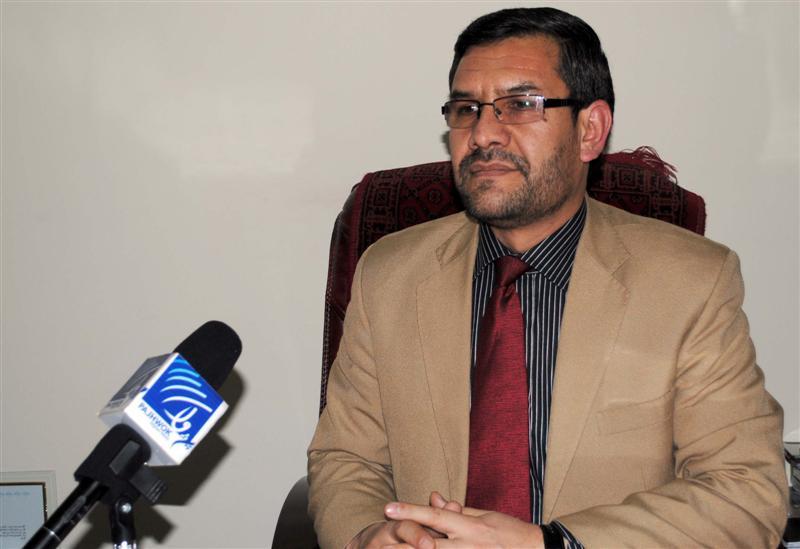KABUL over the past decade, a senior Information and Culture Ministry official said on Monday.
“There have been many positive changes on the media landscape since the establishment of the interim government more than a decade ago,” Deputy Information and Culture Minister Mubarez Rashidi claimed.
During an exclusive interview with Pajhwok Afghan News, he said the Taliban regime did not allow TV channels to broadcast programmes; even Afghanistan National Television programmes were off the air and very few print media outlets operated in the country.
Since the collapse of the Taliban regime, the number of visual, audio and print media outlets had soared to 1,400, including 50 TV stations, Rashidi said.
Except the national television, previously known as Radio Television of Afghanistan (RTA), all other channels are privately run. As many as 150 radio stations, including 34 government-controlled entities, are airing their programmes across the country, he added.
“Of 1,200 media outlets, including daily, weekly, biweekly, monthly newspapers and magazines and TV stations registered with the ministry of information and culture, 800 outlets are operational,” he said.
The number of media outlets increased because they were welcomed by people, he said, adding the enormous increase had empowered the media to be considered as the fourth pillar of the government.
“The media is considered the fourth pillar until it remains professional. Otherwise, it can harm and mislead the society,” he added.
Donor countries paid attention to the media in Afghanistan because it reflected the voice of people and served a strong counterweight to the government, he said.
“People in Afghanistan refer their problems and cases to media outlets before moving a court in this regard. This shows how much strong the media is here,” he said.
Rashidi also hinted at some weaknesses in the media, saying it should also focus on education and culture programmes like shows, dramas and entertainment.
He said the media filled most of its time on reporting political and economical issues, disputes inside the government and controversies surrounding Parliament and the government, bomb blasts, suicide attacks, robberies, kidnappings and others. He said such programmes only exposed weaknesses in the three other pillars of the government — the judiciary, the legislative and the executive.
He said other major issues including human rights, citizens’ rights and corruption also needed attention on the part of media.
He said films and drama serials were useful for bringing positive changes in the society, but unfortunately very less attention was paid in this regard.
Most of drama serials and films broadcast on private TV channels in Afghanistan from India, the US and Turkey had a negative impact on the society, the official said.
He also lambasted some media outlets for putting the national interests in danger through their unprofessional programmes.
Rashidi said there were some TV channels working for promotion of interests of certain political figures and parties. He said such activities were against the national interest. He informed some TV channels had been registered in the name of political leaders such as Aina, Noor, Rah-i-Farda, and Nigah.
Aina TV belongs to Gen. Abdul Rashid Dostam, leader of Junbash Mili Islami, Noor belongs to Prof. Borhanuddin Rabbani, the slain leader of Jamiat-i-Islami, Nigah TV is the property of Mohammad Karim Khalili, the leader of Hizb-i-Wahdat Islami, Rah-i-Farda belongs to Hizb-i-Wahdat Islami leader.
However, the TV channels heads said they had never acted against the national interests and only reflected what people had demanded.
Mohammad Yasin Khamosh, publication director of Aina TV, denied the TV worked in the interest of its owner, saying they broadcast programmes independently. He also rejected as baseless that the channel was working to fuel ethnic disputes, saying all their programmes were in line with the relevant law. He said they aired only a two-hour prgramme in Turkmen language daily.
Broadcasting manager of Rah-i-Farda TV, Abas Agah, said they had never broadcast such a programme which could spark ethnic tensions. He said if they had any it must be carrying opinions from both sides.
“Since there is the freedom of expression, the ministry of information should not attach its hopes to media outlets that they would air programmes in favour of the government,” he added.
Afghanistan National Journalists Union chief Abdul Hameed Mubarez said all political parties had the right to broadcast their opinions through media if their opinions did not violate the constitution and the media law.
myn/ma







GET IN TOUCH
NEWSLETTER
SUGGEST A STORY
PAJHWOK MOBILE APP